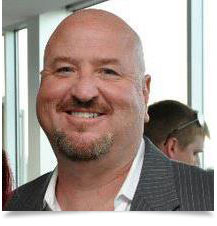Alumni Advantage Newsletter

Are you interested in receiving the 'Unfair Advantage' newsletter? If so, please click below to subscribe.
SubscribeMay 2013 Articles:
- Take My Word For It – Ignorance is Bliss
- To Succeed, Everyone has to Sell
- Want Your Dream Job? Let Them Know You Aren't Done Yet
Unfair Advantage is a newsletter written by members of the National Professional Advisory Board of the College of Media & Communication and our friends. We'll give you insider advice, insight and inspiration so that, when you enter the real world, you are ready to rock it.
Take My Word For It – Ignorance is Bliss
By Alex Wells, Principal, Aars | Wells

Alex Wells
As students preparing to enter today's fast moving world of marketing communications,
you've got some big challenges ahead of you that have very little to do with your
level of strategic thinking or creative talent. You're not alone.
These days, both new grads and experienced professionals alike are struggling to
keep up with the rapid pace of innovation happening in our industry. And despite the
abundance of subject matter “experts” that you'll no doubt encounter as you enter
your desired segment of the industry, I can assure you that everyone in this business
is drinking from the fire hose right now.
My advice is to embrace this environment of discovery. Be honest about what you don't
know. In fact, be proud of it. But whatever you do, don't allow yourself to succumb
to intimidation about the gaps in your knowledge of a particular subject. And more
important, don't try to fake it until you make it. I made these mistakes early in
my career and have now become convinced that I would have generated infinitely greater
success in complex situations had I simply pleaded ignorance and asked what I feared
at the time would be viewed as dumb questions.
As the owner of a small agency, it's true that clients hire my firm because they
trust us to be subject matter experts. But they also depend on us to be transparent
and candid about the limits of our knowledge. And their confidence in us grows when
they can see that we're making a genuine effort to learn about their business, rather
than making false assumptions or pretending that we know everything. They're assured
that our concern for their business welfare trumps any temptation to try to make a
few extra bucks by pushing an unnecessary solution or taking on a project that's beyond
our skillset.
It's no different with employers – they will appreciate the fact that you're mature
enough to admit your weaknesses. They just want to see that you're willing to learn
something new…that you're open minded and capable of taking on challenges. If you're
not, then you should really consider another career path, because the state of flux
in this industry is likely to continue for a long time to come. Make no mistake –
learning new things and challenging yourself are now industry requirements.
I once heard a quote that said, “better to keep your mouth shut and appear stupid
than to open it and remove all doubt.” I strongly disagree. But hey, what do I know?
Alex Wells is the president and chief brand strategist at Aars | Wells, an integrated communications agency located in Dallas, Texas. Since its founding in 2002, Aars | Wells has served over 200 clients, including names such as BP, AT&T, Cotton Patch Café, Stream Energy, CompUSA, SMU, The Cattle Baron's Ball and Andrews Distributing Company. The firm's work has earned more than 50 creative awards and resulted in scores of successful case studies for a diverse range of clients. Alex has served as a member of the College of Media and Communication's National Advisory Board since 2006.
To Succeed, Everyone has to Sell.
by Chris Rohland, Director of Sales and Business Development, Streetwise Media

Chris Rohland
As an entrepreneur and media salesperson, I have often laughed when I have heard people
who are technically on the “non-sales” side of a business talk about how they aren't
involved in sales or building revenue. This is particularly funny when I hear team
members at a small company or start up say it. I have even heard a sales manager say
that now that they are in management and don't sell, that they aren't the best person
to speak with because they aren't doing day to day sales anymore. Say What?
The truth is, everyone in an organization is one way or another involved in selling.
That's because everyone in your organization has an impact on your customers or clients.
However team members go by such titles as “Business Development Managers” or “Relationship
Builders” or a number of other creative titles to help feed the denial that they are
indeed in sales. Then there are the people on the team that do research or develop
the product itself. No way they are in sales right? Wrong. Everyone is in sales. Sales
are what take a product to market. It is what makes a product viable and profitable
and pays everyone's salaries. Sales are the life blood of a company.
So what are sales? Sales doesn't have to be that negative thing everyone associates
with that slick guy in the cheap suit. It really is building strong relationships
from multiple channels and working with those relationships to move a business forward.
It is that simple. However, people try to make it hard. So here are some simple tips
to help everyone on your team sell.
Network – One of the easiest ways for everyone to make connections and build relationships.
It is as simple as showing up to an event and talking with a few people. Ask what
those people are looking for and see if you can help them.
Develop a 60 second elevator pitch – Everyone on your team should have a quick snapshot pitch in their back pocket and
be able to tell people what you do and what it can do for them in a flash. This pitch
should basically introduce your company and get people immediately thinking about
having a longer conversation later.
Break the stereotype – Teach your team that the word sales is not a bad one. Talk regularly about how
the new world of sales is less about talking people into something and more about
just listening to people talk about their needs. Then providing a product or service
that helps them satisfy those needs. Everyone on the team should work to be a good
listener.
Have fun with it – Not everyone is naturally good at business development. Make it fun for your team
to seek out and have conversations with the right people. Give them fun business cards
to hand out or give them unique leave behinds people will love getting. Even a programmer
or product engineer will feel more comfortable approaching people when it is fun.
So no matter what your major is or plan for employment when you leave Texas Tech,
it would serve you well to embrace sales and hone your selling skills. Choosing to
be a part of your company's business development is something everyone on your team
should do. The sooner the entire company gets that it is everyone's responsibility
to promote and evangelize your product, the sooner you will be on a clear path to
success and profitability.
Chris Rohland is the Director of Sales and Business Development for Streetwise Media, Publisher of www.bostinno.com and www.InTheCapital.com. He has over 21 years experience in the sales, marketing and publishing. He can be reached at crohland@streetwise-media.com or on twitter @crohland.
Want your dream job? Let them know you aren't done yet
by Tony Wright, CEO of WrightIMC

Tony Wright
Over dinner the other night, my seven-year old son was discussing what he wanted to
be when he grows up. Watching his mind start to dream was a very fulfilling moment
for this Dad – but then he asked me a profound question:
“Daddy, how did you know what you wanted to be when you were little?”
I started to look back at my career in digital advertising over the last 15 years
and realized that since I actually started my career, I haven't really put that much
definition into what I want to be, but who I want to be.
When I was little, it was a different story. Careers seemed to be black and white.
My Dad was a CPA. He graduated from Texas Tech, became a CPA and 47 years later is
still a CPA. I knew of some people that changed jobs – but I didn't think that you
could actually change what you did for a living. That choice seemed to be set in stone.
And in my mind, the implications were clear – choose wisely or be miserable.
What I didn't know is that the career path I actually set upon didn't even exist
when I was my son's age. Even when I started down the path I'm on now, most of the
twists and turns I took weren't mapped out by those before me. And I'm not even that
old (well, relatively - I do turn 40 this year).
Now I own one of the largest digital advertising agencies in Texas. Most would say
I've had at least some modicum of success. But when I sat in your shoes as an undergraduate
majoring in Journalism, I had no idea I wanted to do what I do. In fact, I was dead
set against this path. I was going to change the world, one by-line at a time. No
selling out for me.
But over time I realized that my definition of selling out actually was actually
just selling myself short. I love to technology and the internet. I love to persuade
people. And I've actually able to say I've probably changed the world more effectively
one campaign at a time than I would had I continued to toil behind a press-pass with
ink-stained fingers.
What enabled me to switch from journalism to advertising was not a new certification,
more school (although I did go ahead and get my Masters in Advertising, which is a
good thing to have) or years of toil at the bottom of an industry. Those things can
get you there, but I took a different path.
I never stopped learning.
College wasn't the end of learning for me. It was the beginning. When I finished
my undergraduate degree in 1995, I had seen the world wide web exactly 4 times. But
I wanted to learn about it, so I did.
And then I parlayed my learning into expertise. But expertise isn't enough either.
I had to learn how to communicate that expertise so others could understand its value.
So as you look beyond your time at Tech and landing that first job, don't think that
your education is over. It's just beginning. If you communicate that a passion for
learning with the firm foundation you've created, you will find a job. In that job,
don't settle with what they teach you, but try to learn more. Always try to learn
more. That's how you get ahead. That's how you succeed.
Just keep learning.
With more than ten years of hands-on and strategic experience in interactive marketing and a background in traditional and interactive public relations and journalism, Tony Wright, CEO and Founder of WrightIMC has spent his career helping businesses of all sizes be profitable on the Web. Wright is a search marketing expert and also has extensive experience in online crisis communication and brand reputation strategy, including corporate blogging and corporate monitoring, most notably directing the online corporate reputation management strategy for American Airlines immediately following the events of September 11, 2001. Wright serves on the board and is past president of the Dallas/Ft. Worth Search Marketing Association. He is also a frequent national speaker on search engine marketing, interactive advertising and reputation management topics. Wright received his Master of Arts in Mass Communication from Texas Tech University in 1999. @tonynwright
Archive
College of Media & Communication
-
Address
Texas Tech University, Box 43082, Lubbock, TX 79409 -
Phone
806.742.6500
